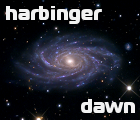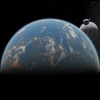|
Cataloging Astronomical Objects
|
|
| HarbingerDawn | Date: Saturday, 10.11.2012, 22:43 | Message # 1 |
 Cosmic Curator
Group: Administrators
 United States
United States
Messages: 8717
Status: Offline
| [Split from this thread]
I disagree with the practice of naming exoplanets. There are hundreds of billions of planets in our galaxy alone, it would be impossible to give even a small fraction of them unique names. Only "special" ones should be named. What we do need is a better system for assigning identifiers to them. The whole b, c, d, e, etc thing is absurd. I could possibly accept it if it started with "a", and their reasons for skipping "a" are utter nonsense, but as it is I don't accept it.
In my view, once a planet's order within its system is known with certainty, then it gets a Roman numeral. By that system, Mercury would be Sol I, Venus would be Sol II, and so on. But since you will obviously not discover all planets in a system at the same time, you would need provisional designations as well. Then you would do like we do today, go in the order in which they were discovered. Here you could use a decimal and a two-digit Arabic numeral identifier. So Gliese 581 b would become Gliese 581.01, Gliese 581 e would become Gliese 581.04, and so on.
That is just my view on the subject.
All forum users, please read this!
My SE mods and addons
Phenom II X6 1090T 3.2 GHz, 16 GB DDR3 RAM, GTX 970 3584 MB VRAM
|
| |
| |
| smjjames | Date: Saturday, 10.11.2012, 23:09 | Message # 2 |
|
World Builder
Group: Users
 United States
United States
Messages: 913
Status: Offline
| I
Quote (HarbingerDawn) I disagree with the practice of naming exoplanets. There are hundreds of billions of planets in our galaxy alone, it would be impossible to give even a small fraction of them unique names. Only "special" ones should be named. What we do need is a better system for assigning identifiers to them. The whole b, c, d, e, etc thing is absurd. I could possibly accept it if it started with "a", and their reasons for skipping "a" are utter nonsense, but as it is I don't accept it.
In my view, once a planet's order within its system is known with certainty, then it gets a Roman numeral. By that system, Mercury would be Sol I, Venus would be Sol II, and so on. But since you will obviously not discover all planets in a system at the same time, you would need provisional designations as well. Then you would do like we do today, go in the order in which they were discovered. Here you could use a decimal and a two-digit Arabic numeral identifier. So Gliese 581 b would become Gliese 581.01, Gliese 581 e would become Gliese 581.04, and so on.
That is just my view on the subject.
I don't think they are actually naming them, they're just compiling lots of names to provide suggestions and ideas for names, thus the baby name book thing.
Tatoonie is more of a nickname since it's been applied to many different planets, but there will be only one Tatoonie, if you get my drift. 
Osiris and Bellerophon are both early discoveries and they're special in that way.
I agree though in that only special planets should be named, like for example the destination of a colonist ship, the planets of that system. Also, theres nothing like having the colonists name their planet rather than it be pre-named. The first confirmed earthlike planet or planet with life on it shoiuld definetly get a name.
As for skipping 'a', since the a is the first letter of the alphabet, the designation of 'a' would go to the central gravitational body, so it kind of makes logical sense in that way. However, I don't see any reason why it can't be Gilese 581 a since obviously Gilese 581 or HD #####... or whatever the star is named is obviously not 'a' since 'a' would be the first object orbiting said star.
In multiple systems, yea you'll have to do that for the star, Alpha Centauri A and B for example, but since 'a' is lowercase, I don't see a problem with using 'a'. Kind of rambled off there I think, heh.
Still, using a system like SE does with the numbering would be more intuitive, or using roman numerals which is commonly used in fiction.

Edited by smjjames - Saturday, 10.11.2012, 23:13 |
| |
| |
| HarbingerDawn | Date: Sunday, 11.11.2012, 05:07 | Message # 3 |
 Cosmic Curator
Group: Administrators
 United States
United States
Messages: 8717
Status: Offline
| Quote (smjjames) like for example the destination of a colonist ship, the planets of that system. Also, theres nothing like having the colonists name their planet rather than it be pre-named.
Yes, I strongly agree with this.
Quote (smjjames) As for skipping 'a', since the a is the first letter of the alphabet, the designation of 'a' would go to the central gravitational body, so it kind of makes logical sense in that way.
No it doesn't. Stars/barycenters are labeled with capital letters, planets receive small letters. And there are many systems with a "B" star, "C" star, and so on. α Cen B b, for example. See what I mean? What would be the harm in it having been α Cen B a? It would have confused no one. This is just another example of the IAU being an inept body of boneheads that can't use logic and reason worth a damn (I really dislike the IAU, if you haven't noticed).
Quote (smjjames) Still, using a system like SE does with the numbering would be more intuitive, or using roman numerals which is commonly used in fiction.
I like using different identifying marks for different types of bodies. Since Roman numerals are the most unwieldy, it makes sense to use them for the category of objects that there are fewest of. In this case, planets. Then moons can receive numbers in Arabic numerals. Specific populations of bodies might receive a prefix based on a Greek letter. If a system has two asteroid belts, members of the inner belt might have designations starting with α, the outer belt starting with β, and so on for other general populations of bodies. I had a more refined and figured-out system than this at one point, but I forgot it.
All forum users, please read this!
My SE mods and addons
Phenom II X6 1090T 3.2 GHz, 16 GB DDR3 RAM, GTX 970 3584 MB VRAM
Edited by HarbingerDawn - Sunday, 11.11.2012, 05:14 |
| |
| |
| OrbitalResonance | Date: Monday, 12.11.2012, 02:26 | Message # 4 |
 Astronaut
Group: Users
 United States
United States
Messages: 67
Status: Offline
| Quote But since you will obviously not discover all planets in a system at the same time, you would need provisional designations as well.
The bcd system is the provisional system and i am quite a fan of it.
Just in spite here is sol sys in the bcd sys.
Sol Ab - Mercury
Sol Ac - Venus
Sol Ad - Earth
Sol Ae - Mars
Sol Af - Jupiter
Sol Ag - Saturn
Sol Ah - Uranus
Sol Ai - Neptune
"We make our world significant by the courage of our questions and the depth of our answers" - Carl Sagan
Edited by OrbitalResonance - Monday, 12.11.2012, 02:27 |
| |
| |
| HarbingerDawn | Date: Monday, 12.11.2012, 06:28 | Message # 5 |
 Cosmic Curator
Group: Administrators
 United States
United States
Messages: 8717
Status: Offline
| Quote (OrbitalResonance) i am quite a fan of it.
Why are you a fan of it? I can get on board with the small letters thing, but how can you accept starting with b as being logical? It makes no sense.
Also, with the provisional system Sol would in fact look like this (assuming one uses the current system)
Mercury - Sol b
Venus - Sol c
Earth - Sol g
Mars - Sol d
Jupiter - Sol e
Saturn - Sol f
Uranus - Sol h
Neptune - Sol i
Note that Earth would be g because it was not accepted as a planet until long after the other 5. Of course one could make the argument that prior to that the other planets were not accepted to be orbiting Sol either.
Personally I think that this system is not very elegant, and would give us hell if we ever discovered a system with more than 25 planets.
All forum users, please read this!
My SE mods and addons
Phenom II X6 1090T 3.2 GHz, 16 GB DDR3 RAM, GTX 970 3584 MB VRAM
|
| |
| |
| apenpaap | Date: Monday, 12.11.2012, 09:52 | Message # 6 |
 World Builder
Group: Users
 Antarctica
Antarctica
Messages: 1063
Status: Offline
| I think it would be
Mercury - Sol f
Venus - Sol b
Earth - Sol g
Mars - Sol c
Jupiter - Sol d
Saturn - Sol e
Uranus - Sol h
Neptune - Sol n
Since when Neptune was discovered, Ceres, Juno, Pallas, Vesta, and Astraea were considered planets too, and Mercury was probably discovered after the other naked-eye planets, given how tricky it is to see. Also, I agree that it's an unelegant system, skipping a and using order of discovery.
I occasionally stream at http://www.twitch.tv/magistermystax. Sometimes SE, sometimes other games.
|
| |
| |
| SpaceEngineer | Date: Monday, 12.11.2012, 10:17 | Message # 7 |
 Author of Space Engine
Group: Administrators
 Russian Federation
Russian Federation
Messages: 4800
Status: Offline
| Speaking of aliens, if they discover our planets with the same methods as we use now, and if they use the same naming system, they have:
Sol a - Sol
Sol b - Jupiter
Sol c - Venus
Sol d - Earth
Sol e - Saturn
Sol f - Mars
Sol g - Mercury
Sol h - Uranus
Sol i - Neptune
I assume they'd firstly discover Jupiter with a radial velocity method, then Venus and Earth with a transit method, then Saturn with a radial velocity method, Mars and Mercury with a transit method and finally Uranus and Neptune with direct imaging.
I agree, there's no sense to reserve a letter 'a' for the star, I never seen this useage, we can always refer to a star as just 'Sol' or 'Gliese 581', or 'Alpha Centauri B' without any small letter. This is why I invented my own naming system for SE, that covers multiple star cases too.
*

|
| |
| |
| HarbingerDawn | Date: Monday, 12.11.2012, 11:50 | Message # 8 |
 Cosmic Curator
Group: Administrators
 United States
United States
Messages: 8717
Status: Offline
| Quote (apenpaap) Mercury was probably discovered after the other naked-eye planets, given how tricky it is to see.
It was almost certainly observed before anyone had any concept of what a planet might be. People had likely been observing Mercury since before the dawn of civilization, so its "discovery date" should be considered to be the same as Mars, Venus, Jupiter, and Saturn.
All forum users, please read this!
My SE mods and addons
Phenom II X6 1090T 3.2 GHz, 16 GB DDR3 RAM, GTX 970 3584 MB VRAM
|
| |
| |
| OrbitalResonance | Date: Monday, 12.11.2012, 14:56 | Message # 9 |
 Astronaut
Group: Users
 United States
United States
Messages: 67
Status: Offline
| Actually, i would default our system to "being discovered all at once". since there are naked eye planets who knows the first observation. They were probably dinosaurs.
Its better than changing the calalouge number of individual planets. And screw elegance.
But i hear ya on the skipping a thing.
Sol Aa
Sol Ab
Sol a
Sol b
HD 10180 Aa
HD 101080 Ab
HD 10180 a
HD 10180 b
"We make our world significant by the courage of our questions and the depth of our answers" - Carl Sagan
Edited by OrbitalResonance - Monday, 12.11.2012, 15:00 |
| |
| |
| HarbingerDawn | Date: Monday, 12.11.2012, 15:22 | Message # 10 |
 Cosmic Curator
Group: Administrators
 United States
United States
Messages: 8717
Status: Offline
| Quote (OrbitalResonance) Actually, i would default our system to "being discovered all at once"
But they weren't. Mercury-Saturn were known since antiquity, but Uranus and Neptune were not discovered until modern times.
All forum users, please read this!
My SE mods and addons
Phenom II X6 1090T 3.2 GHz, 16 GB DDR3 RAM, GTX 970 3584 MB VRAM
|
| |
| |
| OrbitalResonance | Date: Monday, 12.11.2012, 16:27 | Message # 11 |
 Astronaut
Group: Users
 United States
United States
Messages: 67
Status: Offline
| That doesn't matter, if we can't determine the discovery date of them all we should default the entire system.
anyway here you go
http://www.livescience.com/24700-exoplanet-name-baby-book-uwingu.html
"We make our world significant by the courage of our questions and the depth of our answers" - Carl Sagan
Edited by OrbitalResonance - Monday, 12.11.2012, 16:28 |
| |
| |
| HarbingerDawn | Date: Monday, 12.11.2012, 16:42 | Message # 12 |
 Cosmic Curator
Group: Administrators
 United States
United States
Messages: 8717
Status: Offline
| Quote (OrbitalResonance) That doesn't matter, if we can't determine the discovery date of them all we should default the entire system.
That makes no sense. For extrasolar planetary systems where multiple planets share the same discovery date, those worlds are then named in order of distance from star, but they do not default the entire system on account of that. That would be madness. We were trying to put the Sol system in the same format that is used for exoplanets, and we can considered Mercury-Saturn, with the possible exception of Earth, to have the same discovery date. Following the same rules used to name exoplanets, those 6 planets would then be named in order of distance from the host star. Then planets discovered later are designated by order of discovery. It is absurd to try to rewrite the rules for one particular system for no concrete reason.
All forum users, please read this!
My SE mods and addons
Phenom II X6 1090T 3.2 GHz, 16 GB DDR3 RAM, GTX 970 3584 MB VRAM
|
| |
| |
| apenpaap | Date: Monday, 12.11.2012, 17:03 | Message # 13 |
 World Builder
Group: Users
 Antarctica
Antarctica
Messages: 1063
Status: Offline
| Quote (HarbingerDawn) It was almost certainly observed before anyone had any concept of what a planet might be. People had likely been observing Mercury since before the dawn of civilization, so its "discovery date" should be considered to be the same as Mars, Venus, Jupiter, and Saturn.
Sure, it was observed before anyone had a clue that it was not just another star, but by the same logic, Earth was observed the very first of the planets. However, I think it is likely that Mercury was realised to be a planet (by the chronologically first person to realise that; I know it was discovered on various continents) after the other four naked eye planets. I think it is likely Venus, Jupiter, and Mars were the first that someone realised for they were not ordinary stars, since they are the brightest things in the sky and therefore their movement is very obvious. Since Saturn is only as bright as the brightest stars and moves slower among them, its "discovery" would've required someone to pay closer attention to the constellations; and someone would've had to pay pretty close attention during sunrise and sunset to discover Mercury. So my guess is Saturn was discovered after the other three and Mercury after Saturn, but of course it could've gone differently.
Also, since Sun and Moon also used to be considered planets, if humanity had actually used the current exoplanet naming system from the beginning, the planets wouldn't start until Sol d, come to think of it.
I occasionally stream at http://www.twitch.tv/magistermystax. Sometimes SE, sometimes other games.
|
| |
| |
| SpaceEngineer | Date: Monday, 12.11.2012, 19:29 | Message # 14 |
 Author of Space Engine
Group: Administrators
 Russian Federation
Russian Federation
Messages: 4800
Status: Offline
| Quote (apenpaap) Also, since Sun and Moon also used to be considered planets, if humanity had actually used the current exoplanet naming system from the beginning, the planets wouldn't start until Sol d, come to think of it.
And remebmer that some cultures thought that the morning Venus and evening Venus are different planets (so-called "morning star" and "evening star"). And the same for Mercury.
Also, Galilean moons were discovered in 1610 (400 years ago!), much earlier than Uranus and Neptune. Titan and many other satellites of Saturn were discovered too prior to Uranus. So if you would like to name all bodies with small letters, you will quickly run out of alphabet  But thank God that the historical tradition for naming satellites uses roman numbers in sequence of increasing orbital radius (So Io is Jupiter I, Europa is Jupiter II, etc). But this sequence was broken as new smaller and closer satellites to the planet were discovered - exactly as the exoplanets in multi-planet systems. But thank God that the historical tradition for naming satellites uses roman numbers in sequence of increasing orbital radius (So Io is Jupiter I, Europa is Jupiter II, etc). But this sequence was broken as new smaller and closer satellites to the planet were discovered - exactly as the exoplanets in multi-planet systems.

|
| |
| |
| Salvo | Date: Monday, 12.11.2012, 21:13 | Message # 15 |
 Star Engineer
Group: Local Moderators
 Italy
Italy
Messages: 1400
Status: Offline
| Using, for example Sol Ab is unnecessary, because it should be used only in binary/multiple systems, for example Alpha Centauri Bb, because is a binary system, then I think, like Space Engineer said the "aliens" could know our planet as g or h, because they would have found the more massive planets before Earth...
Anyway, renaming planets might be userful if an exoplanet is very very important for the humans, like a colonial base, or the home planet of another eventual civilization, imagine a technologically-advanced earth, you have to tell your family that you are going to relocate to a planet called "HD 353453 Bg", it would not be cool enought 
Yes, now we are in shi-fi, or just a very optimistic view of civilizzations 
The universe is not required to be in perfect harmony with human ambition.
CPU: Intel Core i7 4770 GPU: ASUS Radeon R9 270 RAM: 8 GBs
(still don't know why everyone is doing this...)
Edited by Salvo - Monday, 12.11.2012, 21:15 |
| |
| |